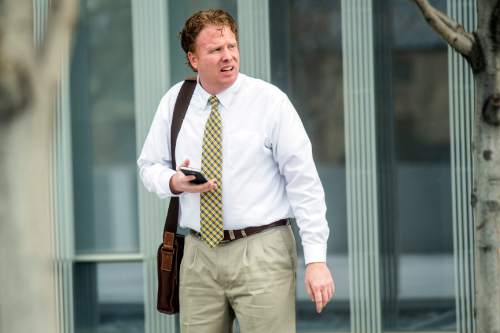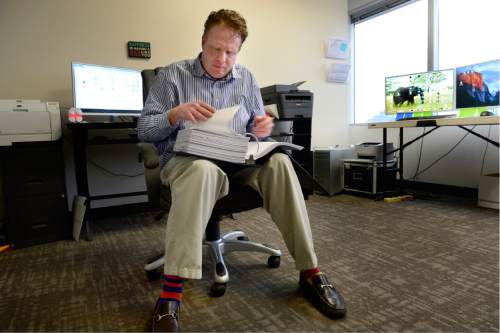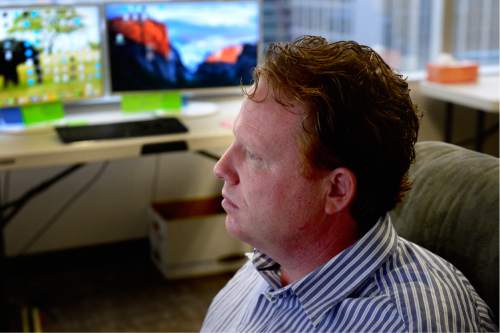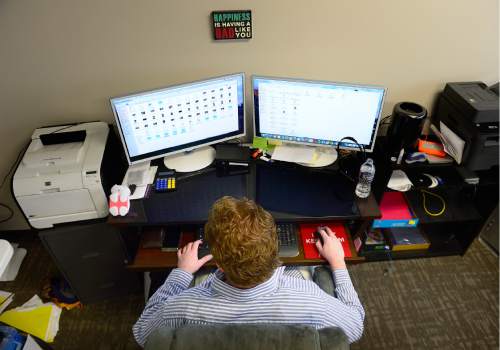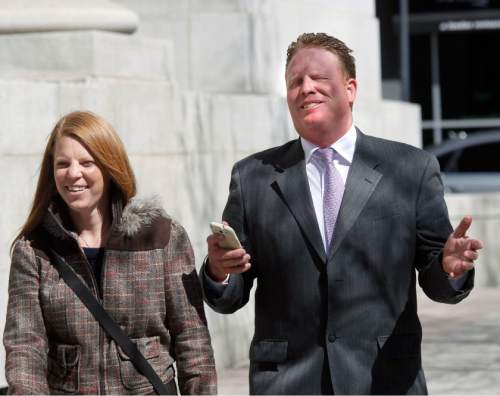This is an archived article that was published on sltrib.com in 2016, and information in the article may be outdated. It is provided only for personal research purposes and may not be reprinted.
St. George businessman Jeremy Johnson stood before a federal court jury on Tuesday and set the stage for his defense in his federal court trial, saying that witnesses would counter an allegation that he was a "con man" who defrauded a bank.
Johnson, who is acting as his own attorney, opened his case by telling the jurors who have sat through four weeks of the prosecution presenting its evidence that he would rebut the statements of one witness who said "I was a con man."
"You'll hear testimony from his boss, as well as the agent we worked with, that that was not the case," Johnson said. "We were transparent."
Johnson and two top-level employees of his company I Works face 86 charges that allege they committed bank fraud and other violations of federal law when they opened bank accounts using companies they had formed under the names of employees, family and friends.
The government alleges that hiding the fact that Johnson and I Works were behind the companies was necessary because the I Works had experienced a huge number of credit card chargebacks and banks had shut down its accounts and put it on watch lists of problem companies.
Johnson, with his wife and two young daughters sitting in the second row of the gallery, set out to try to counter the government's portrayal of him and two co-defendants as setting in motion a plan to obtain bank accounts and, in the process, defrauding Wells Fargo Bank.
As Johnson had promised, Shane Fisher, the co-owner of a company called Mach 1, testified that I Works' chargeback problems were caused by affiliates, independent companies for whom I Works was providing credit card processing.
After I Works' accounts were shut down, Mach 1 set up a meeting with Johnson and CardFlex, the California company that worked directly with a credit card processor and for which Mach 1 acted as sales agent, Fisher testified.
At that meeting CardFlex's owner, Andy Phillips, suggested that I Works use separate companies to process the affiliate accounts in order to identify where problems were coming from, Fisher said.
"Jeremy Johnson told Andy that he was having chargeback problems because affiliates were sending bad traffic to him," Fisher said. "Andy told Jeremy Johnson, 'I've dealt with this before with the porn industry. If you break the corporations up it will help you identify where the bad traffic is coming from.' "
During cross-examination, Assistant U.S. Attorney Michael Kennedy tried to hammer away at Fisher's credibility. Fisher admitted he was mistaken when he had previously attributed information about relationships with banks to Phillips. But Fisher added, "There was never a conversation [with CardFlex] about fooling banks."
Probably Kennedy's most effective moment was when he asked Fisher why I Works just didn't use it own name and addresses for the new processing accounts if all it wanted to do was to try to separate out the bad affiliates.
"That's the part that still kind of bothers me," Fisher said.
The defense's first witness was Megan Spurling, I Works former customer service manager who had been a government witness earlier in the trial and was called back to answer questions about documents that apparently had just recently surfaced.
Under questioning from Amanda Mendenhall, one of attorneys representing co-defendant Scott Leavitt, Spurling identified documents that contained names and personal information of I Works employees that were used to set up the new corporations.
Among them were signed and notarized documents, including powers of attorney, that appeared to show that I Works was authorized to operate the companies and to sign documents for the owners listed on corporate records.
But Kennedy pointed out that the power of attorney document signed by Spurling, and at least some of the other employees, listed I Works where the names of the new companies should have been.
Spurling said she filled out the document herself and didn't know what company name she was supposed to include but still understood she was going to be the owner of a bank account.


